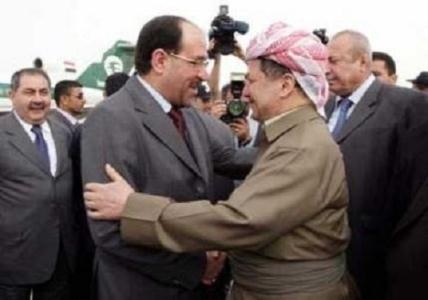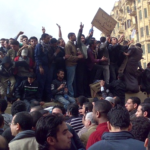Barzani will sich mit Irak und Türkei arrangieren
Let me explain the thinking that ultimately persuaded me to conclude that Maliki will go along with Assad’s strategy in the Jazeera (Northeast Syria), even if doing so causes him to finger through his worry-beads with greater anxiety.
Barzani against the PKK taking power in Syria
Massoud Barzani, the current President of the Iraqi Kurdistan Region, has come out against the PKK taking power in Syria. Barzani said last month that he was helping to arm and train fighters from the Kurdish National Council (KNC), which is the PKK’s rival. One must note that the PKK has renamed itself the PYD in Syria. Thus, Barzani has come out squarely on the side of the Kurdish coalition in Syria that sides with the Turks, Americans and Free Syrian Army. He has decided that the PKK is trouble.
I presume Barzani is doing this in part because he must maintain good relations with Turkey, his major guarantor against Maliki as well as his major economic partner. He is also correctly leery of the PKK, who are a bunch of hot-head nationalist extremists and who are defined as terrorists by most of his allies. Turkey blames them for the deaths of 40,000 in Turkey over the last 30 years.
Barzani certainly does not want Kurdish foreign policy being made by the thuggish PKK. Having his own state to worry about, Barzani can no longer afford to be the nationalist militia leader he once was. He cannot gamble away his own state in order to promote Kurdish independence in Syria or even Greater Kurdistan. He will go soft on independence for Syrian Kurdistan in order to promote the interests of Iraqi Kurdistan.
The PKK as Poison Challis
One is right about Maliki’s caution when it comes to the possibility of a greater Kurdistan. He does not want it. But, as you underline, he is trying to contain Barzani, behind whom are the Turks. If he can hurt Barzani by forcing him to link up with the PKK, he will ruin Barzani’s delicate understanding with the Turks. Should the PKK come out the winner in Eastern Syria, rather than the more moderate KNC, Barzani will be forced into a very difficult and embarrassing position. He will have to chose between his fellow Kurds in Syria, led by the PKK, and Turkey. For this reason, I suspect that Prime Minister Maliki will devilishly refuse to stand in the way of the PKK in Syrian Kurdistan in order to scuttle Iraqi Kurdistan’s pro-Turkish gambit and saddle Barzani with a »terrorist” partner.
Perhaps, I am being too Machiavellian, but what choice does Maliki have? He must go along with his fellow Shiites in Syria and Iran in their goal to spoil Sunni Arab chances of consolidating their rule in Syria. The best way to do this is to prop up Assad as a key player in Syria, even as he loses control of national government, and to promote minorities, such as the Kurds. This will keep Syria destabilized. Maliki must balance his fear of Kurds against his fear of Sunni Arabs.
In Maliki’s domestic power-struggles, the Kurds are his main competitor today. But in his larger regional struggle, the Sunnis are his nemesis in the longer-run — that is, if they can ever get their act together and emerge from the Arab Spring as unified and productive nations. Were I Maliki, I would promote the PKK in Syria as a poison chalice for Barzani. Even if the Kurds negotiate this crisis successfully to emerge as a larger nation, will a larger Kurdistan stand as a greater threat than the Sunni Arabs? I doubt it. Why? Iraq has already lost Kurdistan. (of course there is the complicating factor of Kirkuk) Kurdistan is land-locked and must depend on its neighbors for trade, transport, overflight permission and so much more. Maliki will always be able to contain Kurdistan because of its dependency on Iraq. He can manage its potential dangers. Afterall, who likes the Kurds among Iraq’s neighbors? Not Iran, not Turkey, not Syrian Arabs, and not Saudi Arabia. Only Israel and the US like Kurds. Turkey has emerged as Kurdistan’s protector of sorts, but that is contingent of Kurdistan keeping its expansionist ambitions in check.
Sunni Arabs are Nuri al-Maliki’s Long-term Danger
The Sunnis are the long-term danger for Iraq’s Prime Minister. Sunni Arab Nationalism is the BIG threat. Saudi Arabia has the money and America on its side, which enables it to fund the Sunni insurgency in Iraq, potentially empower a future Sunni Syria to counter-balance Shiite Iraq, squeeze Iraq diplomatically and perhaps economically (Should the US ever decide to sanction Iraq due to its alliance with Iran and sanction busting financial transactions with the nasty Persians). The recrudescence of al-Qaida in Iraq, Salafist bombings in Baghdad, and general revanchist Sunni agitation is preventing Maliki from bringing stability and security to Iraq more than the Kurds are. They are not giving up. A consolidated Sunni Syria will breathe new life into Iraq’s angry Sunnis. They have not come to terms with the notion of a Shiite dominated Iraq. For this reason, Maliki may choose to stoke the flames of Kurdish expansionism in order to douse Sunni expansionism? Keeping the Syrians off balance will help neutralize Saudi Arabia and Turkey, the real neighborhood bullies from Maliki’s perspective. What is more, the chances of the Kurds actually pulling off Greater Kurdistan must look very small compared to the chances that the Sunni Arabs, backed by the US and Israel, will launch a major counter-offensive against the feared »Shiite Crescent”. They are looking to destabilize Iran and limit the sway of Shiite authority in Lebanon, Damascus and Baghdad.
You write that »Baghdad is going to have to walk a very fine line where Syria’s Kurds are concerned: they can’t denounce Bashar’s strategy of giving the PYD control of Kurdish areas, but neither can they countenance an autonomous, free-floating Syrian Kurdistan that could someday join up with Barzanistan…”
This is very well stated. We agree that Maliki faces a dilemma in Syria in balancing Kurds against Sunnis. His balance-of-power calculations will require a delicate dance in which he will likely be compelled to do-si-do his partners, sometimes leaning toward the Kurds and at others toward the Sunni Arabs in order to advance Baghdad’s interests and keep both of his adversaries from growing stronger.
Themenbezogene Interessenbindung der Autorin/des Autors
Joshua Landis ist Professor für Internationale Beziehungen und Direktor des «Center for Middle East Studies» an der University Oklahoma, USA. Landis spricht fliessend Arabisch, Französisch und Englisch. Seine Familie lebte zuerst in Saudiarabien und im Libanon.










